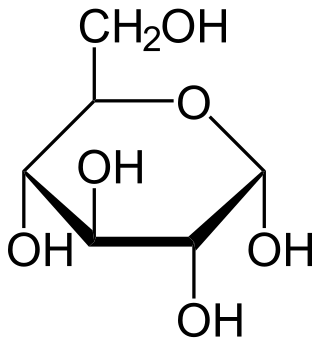
Glucose is a sugar with the molecular formula C6H12O6. Glucose is overall the most abundant monosaccharide, a subcategory of carbohydrates. Glucose is mainly made by plants and most algae during photosynthesis from water and carbon dioxide, using energy from sunlight, where it is used to make cellulose in cell walls, the most abundant carbohydrate in the world.
Monosaccharides, also called simple sugars, are the simplest forms of sugar and the most basic units (monomers) from which all carbohydrates are built. Simply, this is the structural unit of carbohydrates.

Some chemical authorities define an organic compound as a chemical compound that contains a carbon–hydrogen or carbon–carbon bond; others consider an organic compound to be any chemical compound that contains carbon. For example, carbon-containing compounds such as alkanes and its derivatives are universally considered organic, but many others are sometimes considered inorganic, such as halides of carbon without carbon-hydrogen and carbon-carbon bonds, and certain compounds of carbon with nitrogen and oxygen.

Organic chemistry is a subdiscipline within chemistry involving the scientific study of the structure, properties, and reactions of organic compounds and organic materials, i.e., matter in its various forms that contain carbon atoms. Study of structure determines their structural formula. Study of properties includes physical and chemical properties, and evaluation of chemical reactivity to understand their behavior. The study of organic reactions includes the chemical synthesis of natural products, drugs, and polymers, and study of individual organic molecules in the laboratory and via theoretical study.
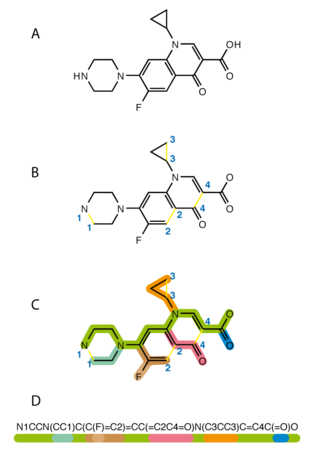
The simplified molecular-input line-entry system (SMILES) is a specification in the form of a line notation for describing the structure of chemical species using short ASCII strings. SMILES strings can be imported by most molecule editors for conversion back into two-dimensional drawings or three-dimensional models of the molecules.

The American Chemical Society (ACS) is a scientific society based in the United States that supports scientific inquiry in the field of chemistry. Founded in 1876 at New York University, the ACS currently has more than 155,000 members at all degree levels and in all fields of chemistry, chemical engineering, and related fields. It is one of the world's largest scientific societies by membership. The ACS is a 501(c)(3) non-profit organization and holds a congressional charter under Title 36 of the United States Code. Its headquarters are located in Washington, D.C., and it has a large concentration of staff in Columbus, Ohio.
Psi is an ab initio computational chemistry package originally written by the research group of Henry F. Schaefer, III. Utilizing Psi, one can perform a calculation on a molecular system with various kinds of methods such as Hartree-Fock, Post-Hartree–Fock electron correlation methods, and density functional theory. The program can compute energies, optimize molecular geometries, and compute vibrational frequencies. The major part of the program is written in C++, while Python API is also available, which allows users to perform complex computations or automate tasks easily.
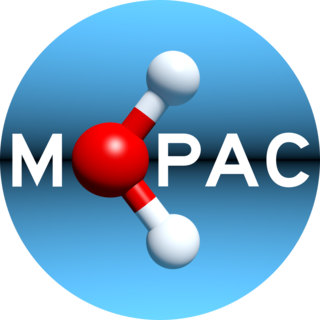
MOPAC is a popular computer program used in computational chemistry. It is designed to implement semi-empirical quantum chemistry algorithms, and it runs on Windows, Mac, and Linux.

Open research is research that is openly accessible by others. Those who publish research in this way are often concerned with making research more transparent, more collaborative, more wide-reaching, and more efficient. Open research aims to make both research methods and the resulting data freely available, often via the internet, in order to support reproducibility and, potentially, massively distributed research collaboration. In this regard, it is related to both open source software and citizen science.
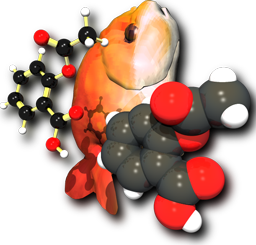
Open Babel is computer software, a chemical expert system mainly used to interconvert chemical file formats.

The Chemistry Development Kit (CDK) is computer software, a library in the programming language Java, for chemoinformatics and bioinformatics. It is available for Windows, Linux, Unix, and macOS. It is free and open-source software distributed under the GNU Lesser General Public License (LGPL) 2.0.
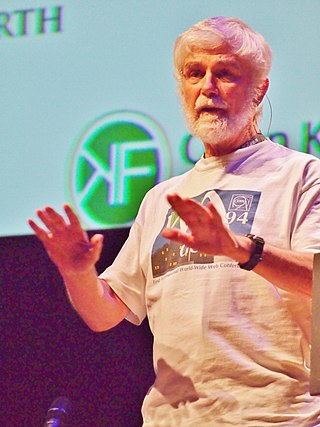
Peter Murray-Rust is a chemist currently working at the University of Cambridge. As well as his work in chemistry, Murray-Rust is also known for his support of open access and open data.
ChemSpider is a freely accessible online database of chemicals owned by the Royal Society of Chemistry. It contains information on more than 100 million molecules from over 270 data sources, each of them receiving a unique identifier called ChemSpider Identifier.
The Kinetic PreProcessor (KPP) is an open-source software tool used in atmospheric chemistry. Taking a set of chemical reactions and their rate coefficients as input, KPP generates Fortran 90, FORTRAN 77, C, or Matlab code of the resulting ordinary differential equations (ODEs). Solving the ODEs allows the temporal integration of the kinetic system. Efficiency is obtained by exploiting the sparsity structures of the Jacobian and of the Hessian. A comprehensive suite of stiff numerical integrators is also provided. Moreover, KPP can be used to generate the tangent linear model, as well as the continuous and discrete adjoint models of the chemical system.
PyQuante is an open-source suite of programs for developing quantum chemistry methods using Gaussian type orbital (GTO) basis sets. The program is written in the Python programming language, but has "rate-determining" modules written in C for speed, and also uses and requires the NumPy linear algebra extensions to Python. The resulting code, though not as fast as other quantum chemistry programs, is much easier to understand and modify. The goal of this software is not necessarily to provide a working quantum chemistry program but rather to provide a set of tools so that scientists can construct their own quantum chemistry programs without going through the tedium of having to write every low-level routine. PyQuante 1.6.3 is the latest stable version of the program.
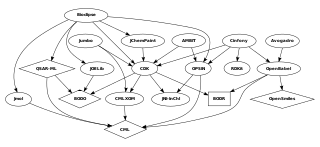
Blue Obelisk is an informal group of chemists who promote open data, open source, and open standards; it was initiated by Peter Murray-Rust and others in 2005. Multiple open source cheminformatics projects associate themselves with the Blue Obelisk, among which, in alphabetical order, Avogadro, Bioclipse, cclib, Chemistry Development Kit, GaussSum, JChemPaint, JOELib, Kalzium, Openbabel, OpenSMILES, and UsefulChem.
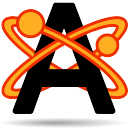
Avogadro is a molecule editor and visualizer designed for cross-platform use in computational chemistry, molecular modeling, bioinformatics, materials science, and related areas. It is extensible via a plugin architecture.
Python-based Simulations of Chemistry Framework (PySCF) is an ab initio computational chemistry program natively implemented in Python program language. The package aims to provide a simple, light-weight and efficient platform for quantum chemistry code developing and calculation. It provides various functions to do the Hartree–Fock, MP2, density functional theory, MCSCF, coupled cluster theory at non-relativistic level and 4-component relativistic Hartree–Fock theory. Although most functions are written in Python, the computation critical modules are intensively optimized in C. As a result, the package works as efficient as other C/Fortran-based quantum chemistry program. PySCF is developed by Qiming Sun. PySCF2.0 is the latest version of the program.

Annual Reports on the Progress of Chemistry was a yearly review journal published by the Royal Institute of Chemistry and after 1980 the Royal Society of Chemistry. It was established in 1904. In 1967 the journal was split into two sections, A and B, covering inorganic and organic chemistry, respectively., In 1980, a third series was started, C, covering physical chemistry. The journal was discontinued in 2013.

SAMSON is a computer software platform for molecular design being developed by OneAngstrom and previously by the NANO-D group at the French Institute for Research in Computer Science and Automation (INRIA).












